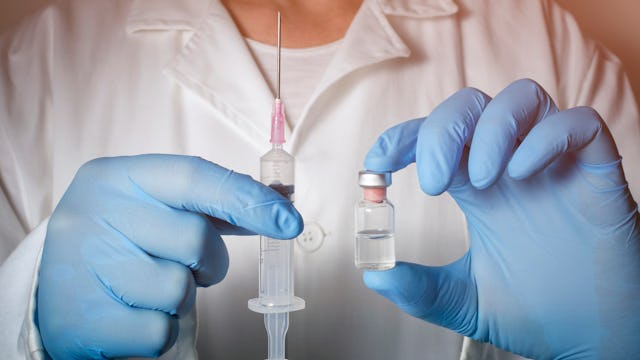HPV Vaccine Now FDA-Approved For Adults Up To 45

HPV vaccine is crucial in preventing some cancers
If you have kids of a certain age, you’ve likely had the conversation with their doctor about the HPV vaccine. While the vaccine can be given to kids beginning at age nine, most doctors suggest giving it around 11 or 12 years of age, so they can get the recommended doses long before becoming sexually active. But a recent announcement by the FDA is now expanding its use for adults up to age 45 — and that’s very big news.
The Food and Drug Administration approved Gardasil 9 for women and men 45 years of age or younger on Friday, the vaccine that protects against the human papilloma virus (HPV). HPV can cause cervical cancer and other cancers in the cervix, penis, anus, throat, and genital warts. HPV can lay dormant for years before symptoms begin and is most often spread through sexual contact.
According to the CDC, nearly 80 million people—about one in four—are currently infected in the United States, with 14 million people becoming newly infected every year. Gardasil was approved in 2006 for boys and girls ages 9-26 to reduce the spread of HPV, getting two to three doses (depending on when you receive first dose).
But this latest announcement could have major impact on millions more, not only to reduce the chances of them contracting HPV, but this latest version also protects against nine strains of HPV (four more than the original) that are responsible for causing most HPV-related diseases.
The FDA based the expansion after following 3,200 women over three and a half years. The study “found that Gardasil 9 was 88% effective in the prevention of vulvar, vaginal and cervical precancerous lesions, cervical cancer and genital warts caused by the nine HPV strains,” CNN reported.
“Today’s approval represents an important opportunity to help prevent HPV-related diseases and cancers in a broader age range,” Dr. Peter Marks, director of the FDA’s Center for Biologics Evaluation and Research, said in a statement. Based on US Centers for Disease Control and Prevention numbers, Marks said, “HPV vaccination prior to becoming infected with the HPV types covered by the vaccine has the potential to prevent more than 90 percent of these cancers, or 31,200 cases every year, from ever developing.”
The FDA recommendation should also go a long way for insurance companies agreeing to cover the costs of the vaccine, usually costing $400-500 out of pocket. “In general, what we’ve seen is that once the FDA gives approval and says there is a good response to the vaccine, we would in short order expect approved coverage from insurers,” Dr. Charles Leath, a gynecologic oncology specialist at the University of Alabama at Birmingham said.
This article was originally published on